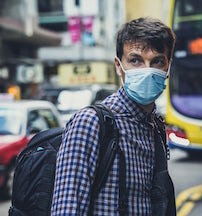Back to Normal

Without a doubt this has been the oddest year. In the aftermath of previous tragedies (terror attacks, mindless acts of violence, natural disasters) we at least could leave our houses.
We’d go to work, take in a movie or a concert, visit bars and restaurants. We may have been sobered by current events, but we weren’t prisoners in our home. We mingled. Socializing allowed us to either talk through what was happening, or provided a welcome distraction.
Now? As one of my friends posted recently, “It’s like I’m 16 again: Gas is cheap and I’m grounded.”
But after a few weeks of isolation we’ve reached the stage where people are beginning to wonder aloud, “When will things go back to normal?”
A more intriguing question is: Can things go back to normal?
It’s a subjective term; your normal may look quite different from mine. But, for the sake of argument, let’s accept that it’s how we went about our daily lives on, say, February 3rd.
Most of us went to work the day after a thrilling Super Bowl. We went about our business and we had stories to share of parties, football, and friends.
Six weeks later there are no parties, no sports of any kind - other than stale replays on ESPN - and our friends have all become virtual.
Today, when we do slip out of our homes, we go about essential activities in a stealthy manner. We hardly make eye contact in grocery stores, and we can’t help but wonder if every stranger passing in the aisle carries the scourge.
Yeah, it’s always been possible to catch an illness from other people. For millennia we’ve passed around cold and flu viruses. But those felt more like an annoyance than a potential life-threatening exchange.
This is different. And we are becoming different.
If we’re being honest, I’d say our innocence is forever lost. Regardless of whether or not a vaccine is introduced this year, won’t we continue to feel leery? Bugs mutate, and who’s to say another scare in 2023 or 2026 won’t be even worse?
Here are some things I wonder about:

Moving forward, how enthusiastic will you be about shaking hands? Has that custom been rendered obsolete?
Millions of jobs are being lost because of the international shut-down. I know millions will return at some point — but will all of them? Is that even possible?
What about every business that’s been forced to close? Will 100% of them re-open their doors? And, even for those that do start back up, will their business model remain the same?
So much of our life is subject to alteration because of natural evolution. Hey, it wasn’t that long ago that people made a living selling ads in something called The Yellow Pages. Newspapers employed tens of thousands of people.
Now people get their news — and get inundated with ads — online. Taxis have been scuttled by ride-share programs. Groceries and everything else can be delivered to our door.
In one of my industries, publishing, the major players in New York have watched an explosion of independent authors and publishers chew up huge chunks of market share. Hundreds of book stores closed when people either started buying their physical books online or downloading them as digital files.
The point is, the way we live and transact business has always been subject to major overhauls. Those changes have seemed pretty quick, even when it took several years.
Today, however, changes are taking place overnight. We’ve been forced by microscopic invaders to alter the ways in which we live, work, and socialize. And we’ve been given no time to adapt; it was business as usual one day, and an alien existence the next.
So, when will things get back to normal? I say, how in the hell can that even happen?
The ways in which we do business might recapture some of the old methods and procedures, but the work-from-home model is not going to give up all the ground it’s gained this year. Companies will be forced to accept this new normal.

Why? Because the workforce will likely approach each new job interview by looking through a prism of “If/When another crisis hits, will I be able to do this job remotely?” The answer will become an important deciding factor for many applicants, and companies will more than likely need to adapt to accommodate those skilled workers.
The ways we interact with strangers will, I fear, never completely go back to the way it was. You can’t have this many people get sick and this many people die from an unseen contagion and not have people remain on alert.
Books and movies warned us for years that something like this was coming, and we chose to leave it in the realm of science fiction and fantasy. Well, the fantasy is now real. I expect it’ll be difficult for many of us to trust large throngs of people for the foreseeable future.
This is not to say that people will never gather in groups again. Of course they will. There will be sporting events, concerts, theater outings, and conferences.
But I’d be stunned if the numbers quickly came back all the way. Honestly, if an announcement came down next week that things were improving, would you rush into a large crowd of strangers?
Financially, people have been told for years to save enough money to have at least a six-month cushion to live on. Most people ignored that advice and spent all their money as fast as they made it. Eat, drink, and be merry, right?
Well, how does a six-month cushion of money sound right about now? I expect attitudes toward financial matters to change quite a bit in the next year or two.
I don’t see us going back to “normal” this year. Maybe not even next year. At least not the normal we recognized on February 3rd.
And, really, who’s to say that’s not for the best? Sure, as a society we squawk at change, and hold on to some stubborn ideal of good old days.
Which is ridiculous. I don’t know a soul who wants to go back to searching for a pay phone in order to make a call, nor do I believe anybody would give up their streaming services and go back to five channels. Ain’t nobody getting sentimental about those good old days, are they?
We romanticize the past and fear the future. It’s always been that way for the masses. And yet it turns out (with only a few exceptions) to be just fine the next day. The process has repeated throughout history in these stages:

We get nervous about change, then we accept it, then we can’t live without it.
The changes brought about by this latest crisis will, for the time being, be extreme, and they’ll be frightening. People will suffer. Sadly, many will lose friends and loved ones.
But there’s no going back to normal. Natural disasters, wars, and technological advances re-shape our world from one year to the next. Our species and our cultures are forced to adapt to new normals all the time. This time it’s simply accelerated.
We will get through this disaster, too. It will be painful and damn scary, but we will come out the other side. We live, we learn, and we grow.
Don’t expect everything to be “normal.” But, also, don’t expect everything to be for the worst.

Dom Testa is a broadcaster and author. His series of spy thrillers,
the Eric Swan series
, is available in print, ebook, and audiobook at your favorite retailer.
Face mask pic courtesy of Free To Use Sounds on Unsplash
Handshake courtesy of Cytonn Photography on Unsplash
Interview courtesy of Christina @ wocintechchat.com on Unsplash
Sunrise image courtesy of Pablo Heimplatz on Unsplash



